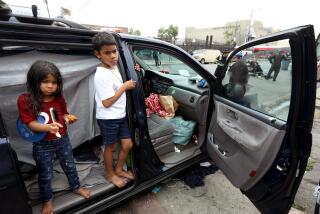Children Repaid With Free Trolley Trip
- Share via
Eight preschoolers accompanied by four adults from the Albert Schweitzer School for the disabled received a free round-trip ride to San Ysidro Friday on the San Diego Trolley to make up for a Feb. 23 incident when an operator ordered the group off at the wrong stop during a rainstorm.
The unnamed operator, who was subsequently ordered to undergo sensitivity training in dealing with the handicapped, failed to check the group’s tickets and ordered them off at the Barrio Logan station, one stop short of their Harborside destination. Six of the children, one in a wheelchair, were handicapped. The same group boarded the trolley at about 10 a.m. Friday at its maintenance facility at 12th and Imperial avenues along with two trolley officials, who supplied the children with trolley T-shirts and took photos of the group, said Lisa Bartman, the children’s teacher who was present during both field trips.
“The whole experience was great,” Bartman said Friday. “It was the best field trip we have ever had. The kids really had a fun time and everyone was very nice.”
San Diego Trolley spokeswoman Judy Leitner, who accompanied the group, said the Feb. 23 incident was an isolated one but trolley officials wanted to be sure that everything went well on Friday’s excursion. Trolley supervisor Mike Cannell also accompanied the group.
“As soon as the situation came to our attention all of the operators were given instructions about sensitivity toward special groups, such as these children,” Leitner said. “We carry over 21,000 people daily and even though this was an isolated incident, it cannot happen again.”
After being ordered off the first trolley at Barrio Logan station, the group was discouraged from boarding a later trolley because the handicapped lift was not working. Passengers and trolley crewmen eventually helped the children aboard.
Schweitzer school officials said ordering the initial operator to undergo sensitivity training, which includes video programs and interaction with handicapped persons, was a good decision because people need to become aware of the special needs of the handicapped.
“I think it is great, but I think all of the operators should have to as well,” Bartman said. “I think they all should learn to understand.”
More to Read
Sign up for Essential California
The most important California stories and recommendations in your inbox every morning.
You may occasionally receive promotional content from the Los Angeles Times.










